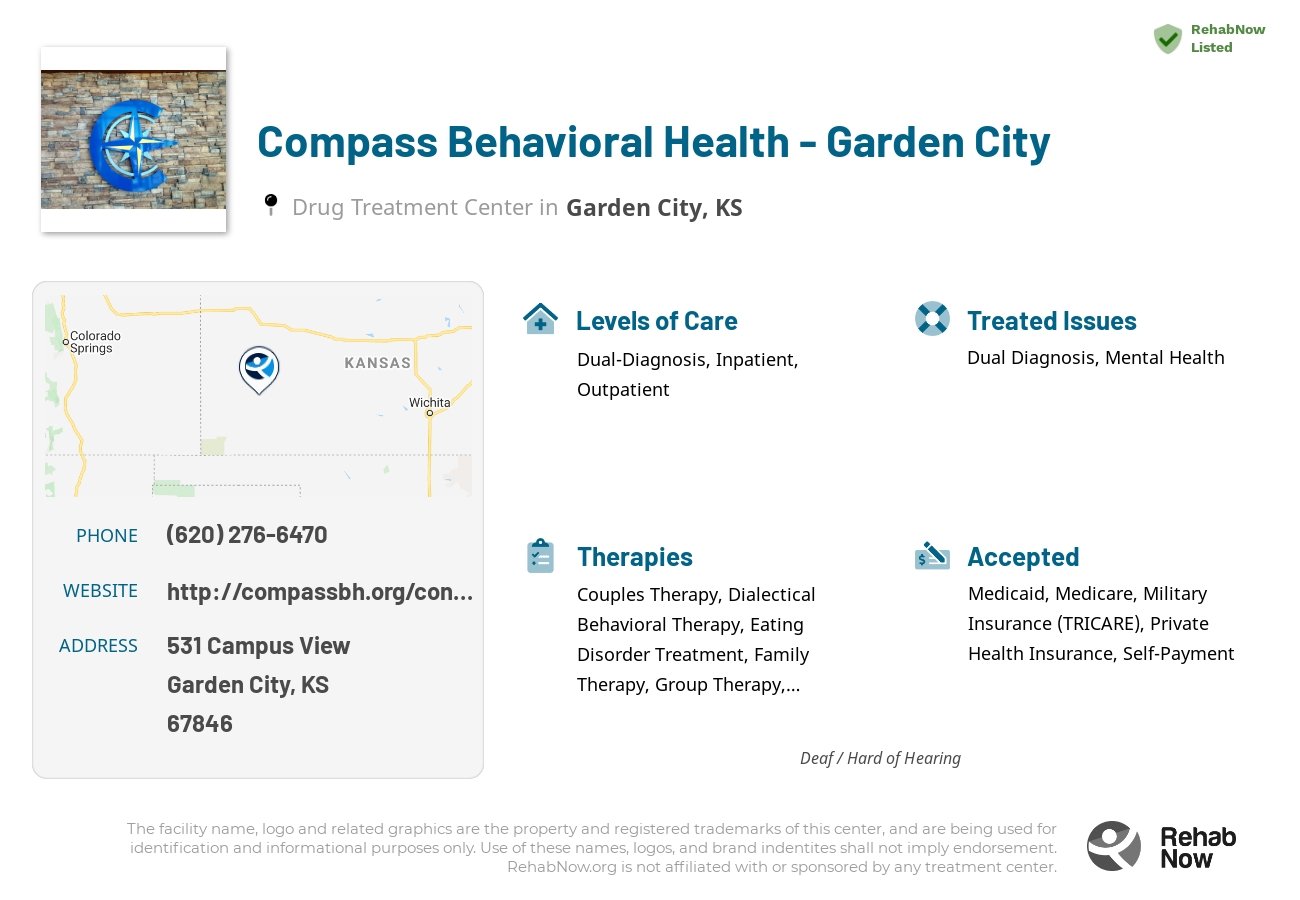Compass Behavioral Health - Garden City
Drug Rehab Center in Garden City, Kansas
Compass Behavioral Health - Garden City is an evidence-based addiction treatment facility in Garden City, KS that specializes in treating individuals with substance abuse, drug addiction, dual diagnosis, mental health and eating disorders utilizing a comprehensive integrated approach featuring inpatient and outpatient services such as individual counseling, group therapy, 12-step meetings and relapse prevention planning.
About This Kansas Facility
Compass Behavioral Health - Garden City is an Addiction Treatment Facility located in Garden City, Kansas. This facility offers a range of services for individuals looking to overcome addiction and achieve sobriety. They specialize in treating people suffering from Dual Diagnosis, Eating Disorders, Mental Health issues, Substance Abuse, and Drug Addiction. With a focus on providing comprehensive care, Compass Behavioral Health - Garden City offers Dual-Diagnosis, Inpatient, Outpatient, and Aftercare Support levels of care. This means that they cater to individuals at various stages of their recovery journey, ensuring that each person receives the specific treatment and support they need to overcome addiction and achieve lasting sobriety. Compass Behavioral Health - Garden City also accepts Private Health Insurance, making their services more accessible to those seeking treatment.
At Compass Behavioral Health - Garden City, individuals struggling with addiction and substance abuse can expect to receive exceptional care and support. The facility offers a range of treatment methods to address the unique needs of each individual. Their team of experienced professionals is skilled in providing Dual Diagnosis treatment, which is essential for individuals struggling with both addiction and underlying mental health issues. This integrated approach allows for a comprehensive understanding of each person's needs and creates a more effective treatment plan. In addition, Compass Behavioral Health - Garden City offers Inpatient and Outpatient treatment options, ensuring that individuals have access to the appropriate level of care based on their specific circumstances. Aftercare support is also provided to assist individuals in maintaining their sobriety and transitioning back into their daily lives. With their commitment to personalized care and evidence-based treatment approaches, Compass Behavioral Health - Garden City is an excellent choice for individuals seeking addiction treatment and support in Garden City, Kansas.
Genders
Ages
Modality
Additional
Conditions and Issues Treated
There are different kinds of Dual Diagnosis:. A person who simultaneously experiences both a mental illness and an addiction disorder. Or, a person who experiences one or more coexisting (simultaneous) mental health conditions in addition to a primary substance use disorder.
The treatment requires a multi-disciplinary approach, it’s crucial for individuals to partner up with a healthcare provider who understands all the recovery components.
Levels of Care Offered at Compass Behavioral Health - Garden City
This center offers a variety of custom treatment tailored to individual recovery. Currently available are Aftercare Support, Dual-Diagnosis, Inpatient, Outpatient, with additional therapies available as listed below.
Inpatient treatment is the most intensive level of care, and it’s necessary for those who aren’t able to control their addiction. These patients also must be drug-free before attending inpatient programs .
During inpatient treatment, addicts live at an inpatient facility 24 hours a day while receiving help. This type of program is generally recommended for those who need to go through detoxification or who are struggling with serious addiction-related issues.
The outpatient programs in Garden City, KS are for those addicted drugs or alcohol. The goal of the outpatient rehabilitation program is to make them stop abusing drugs or alcohol, reduce drug use or addictive behaviors, and become entirely sober. It is generally required to attend the outpatient program for 10-12 hours every week.
Patients can be administered on-the-spot medication to ease withdrawal symptoms such as anxiety, increased heart rate, and even depression. Groups such as Alcoholics Anonymous (AA) and Narcotics Anonymous (NA) can be used as a part of outpatient treatment to help maintain sobriety.
Aftercare support is a service many addicts need to ensure their success at recovery. This service usually includes one-on-one or group therapies, assistance from a sponsor and other types of help designed to make sure the patient continues living a life free from drugs.
Patients also may require medication to help them battle addiction. Some people have been able to successfully recover without additional medications, but others have found that they need help during their transition. Long-term, the patient must take the initiative to attend meetings and receive help from other addicts in recovery.
Therapies & Programs
People in addiction recovery can benefit from individual therapy. This type of therapy involves meeting with a therapist one-on-one. This allows for a personal and trusting relationship to be built so that the patient can be truly themselves and express any emotions they feel. Individual therapy leads to greater understanding and peace about your triggers for addiction and coping strategies to prevent relapse.
Couples therapy for drug addiction is based on the belief that addiction is a family disease. Everyone involved with an addict, not just the addict themselves, is affected by their behavior and the changes the addict goes through. The relationship also changes the addict’s significant other and has likely picked up some codependent behaviors. Codependency is a term used to describe a person obsessed with another person and their needs and feelings while neglecting their own. Addicts are usually people-pleasers, so it is understandable how one can become codependent in relationships with addicts.
Family therapy is a type of group problem-solving that aims to improve communication and relationships between the patient, their family, and sometimes friends. The main goal of family therapy for drug addiction is to create an environment where communication can occur without judgment, hostility, or blame. The therapist is with the family as they learn to communicate with each other differently, especially with the addict when s/he is using.
Group therapy sessions are held in rehab facilities, clinics, churches or community centers that offer drug addiction treatment. People who attend these groups are encouraged to voice their feelings and support other addicts in recovery. This helps group members strengthen their own recovery program while cheering on others who are struggling with sobriety.
Group therapy sessions provide recovering addicts with a chance to cope with everyday situations that many face. Group therapy sessions are held in rehab facilities, clinics, churches or community centers that offer drug addiction treatment.
People who attend these groups are encouraged to voice their feelings and support other addicts in recovery. This helps group members strengthen their own recovery program while cheering on others who are struggling with sobriety.
If you’re looking for addiction treatment, it’s important to find a facility that offers trauma therapy. This type of therapy helps people process and understand the past traumas that have led to their addiction. Trauma therapists will work with clients to help them understand their past and present relationships and show them that they are worthy of love. This therapy is typically done using visualization, discussion, and writing down thoughts and feelings.
Trauma Therapy is a form of therapy that involves working with a patient to help them process and understand the past trauma(s) in their life. This therapy is typically done using techniques such as visualization, discussion, and writing down thoughts and feelings. The main goals of trauma therapy is to help clients express their emotions and talk about what they are feeling.
Dialectical Behavior Therapy (DBT) is a form of cognitive-behavioral therapy that helps people understand how they connect their thoughts, behaviors, and feelings. It can give them more control over their actions, effectively stopping self-harm ideations and attempts in some patients. It also helps put those with borderline personality disorder into control for managing mental struggles.
A new study has shown that DBT works for those with self-harm behaviors and addictions by giving them therapy they can relate to and understand.
Cognitive Behavioral Therapy (CBT) helps addicts identify faulty, negative thinking so that they can work together with the therapist to find healthier ways of thinking. CBT focuses on specific aspects of each person’s thinking, feeling, physiology, and behavior. It aims to identify specific problems in these areas, and create a personalized treatment strategy.
Addicts often experience intense cravings for sugary foods during recovery. By teaching addicts how to eat well and stay healthy, therapists can help them manage their cravings over the course of treatment.
During these sessions, Garden City, Kansas dietitians and therapists will offer advice about healthy eating options and teach addicts how to make specific changes in their diet that can help reduce the effects of cravings during recovery.This type of therapy is often used in conjunction with other types of addiction treatment services. By identifying specific triggers and developing strategies to help addicts avoid relapse, most individuals can overcome their cravings and stay sober for good after they finish rehab.
The first step to becoming a non-smoker is the choice to quit smoking. Nicotine replacement therapies are effective because they provide you with the nicotine you are addicted to without inhaling carcinogens from cigarettes.
There are several types of NRT. These include:
- Nicotine gum
- Nicotine patches (transdermal systems)
- Nasal spray
- Lozenges
The benefits to using NRT can include:
- Reduce the risk of heart disease and cancer
- Reduce the anxiety and irritability associated with quitting smoking
- Reduce the risk of type II diabetes.
- Improved fertility in women
Patient Experience
Experiential Therapy at Compass Behavioral Health - Garden City
Experiential Therapy allows addicts to release emotions in a safe environment. The process involves addicts painting their feelings and releasing them on a canvas. LPE – Love, Peace, and Equilibrium is one of the most popular forms of experiential therapy.
Payment Options Accepted
For specific insurance or payment methods please contact us.
Is your insurance accepted?
Ask an expert, call (888) 674-0062
CGI Communications Associated Centers
Discover treatment facilities under the same provider.
- Compass Behavioral Health - Dodge City in Dodge City, KS
- Compass Behavioral Health - Ulysses in Ulysses, KS
- Compass Behavioral Health - Scott City in Scott City, KS
Learn More About CGI Communications Centers
Additional Details
Specifics, location, and helpful extra information.
Garden City, Kansas 67846 Phone Number(620) 276-6470 Meta DetailsUpdated November 25, 2023
Staff Verified
Patient Reviews
There are no reviews yet. Be the first one to write one.
Garden City, Kansas Addiction Information
About 42% of adults in Kansas have tried an illicit drug at some point in their lives. 12.4% of the state population uses illegal drugs and 4.5% abuse alcohol in a given year. 15.16% of all deaths in Kansas between 2008 and 2017 were caused by either drugs or alcohol.
Garden City is located in Finney County, which had a total of 8 drug overdose deaths in 2017. In 2017, Garden City had a rate of 16.4 opioid overdoses per 100,000 people. The most commonly abused drugs in Garden City are heroin, methamphetamine, and cocaine. Garden City, Kansas, has treatment centers that offer several different treatments. The most common ones are inpatient, outpatient, and 12-step programs.
Treatment in Nearby Cities
- Hiawatha, KS (314.0 mi.)
- Ulysses, KS (38.6 mi.)
- Pittsburg, KS (338.2 mi.)
- Riverton, KS (342.4 mi.)
- Sedan, KS (261.9 mi.)
Centers near Compass Behavioral Health - Garden City
The facility name, logo and brand are the property and registered trademarks of Compass Behavioral Health - Garden City, and are being used for identification and informational purposes only. Use of these names, logos and brands shall not imply endorsement. RehabNow.org is not affiliated with or sponsored by Compass Behavioral Health - Garden City.

